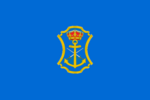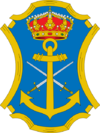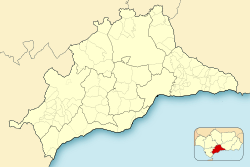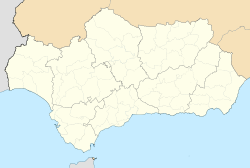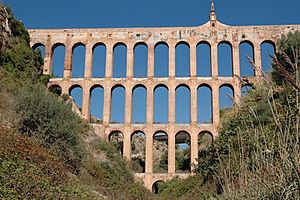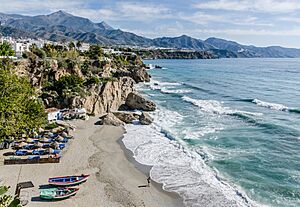Nerja facts for kids
Quick facts for kids
Nerja
|
|||
|---|---|---|---|
|
Municipality and town
|
|||
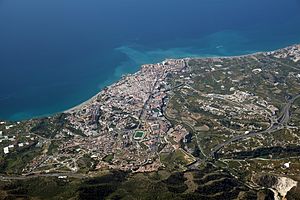 |
|||
|
|||
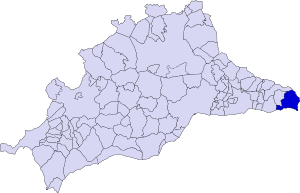
Municipal location in the province of Málaga
|
|||
| Sovereign state | |||
| Autonomous community | |||
| Province | |||
| Comarca | Axarquía | ||
| Area | |||
| • Total | 85 km2 (33 sq mi) | ||
| Elevation | 26 m (85 ft) | ||
| Population
(2018)
|
|||
| • Total | 21,061 | ||
| • Density | 247.8/km2 (642/sq mi) | ||
| Demonym(s) | Nerjeños | ||
| Time zone | UTC+1 (CET) | ||
| • Summer (DST) | UTC+2 (CEST) | ||
| Postal code |
29780
|
||
Nerja is a lovely town on the Costa del Sol in southern Spain. It is part of the province of Málaga in the region of Andalusia. Nerja is located right on the Mediterranean coast, about 50 kilometers (31 miles) east of the city of Málaga.
When the area was under Islamic rule, its name was Narixa. This name means "abundant source" or "plenty of water". This is where the town's current name, Nerja, comes from.
Contents
History of Nerja
Nerja has a very long and interesting history. We know this from ancient cave paintings found in the famous Nerja caves. These paintings are very old, showing that people lived here a long time ago.
Ancient Times and Discoveries
The Nerja caves were discovered in 1959. Scientists now think these caves are just one entrance to a huge system of underground tunnels. These tunnels stretch for many miles into the mountains. They might be one of the biggest unexplored cave systems in Europe. When you visit the caves, you can see the remains of some of the ancient people who lived in Nerja.
The Romans also built three settlements in this area. One of them was called Detunda, and you can still see some large remains from it today.
Arab Rule and the Name Narixa
Later, in the early 8th century, the Arabs took over the area. Under their rule, the town was known as Narixa. As we learned, this name means "abundant spring" or "plenty of water". This is how Nerja got its name.
Nerja was famous for its farm products and silk. People say that these goods were well-known throughout the Muslim world. They were even sold in markets as far away as Damascus by the 10th century.
The Balcón de Europa
The Balcón de Europa is a famous viewpoint in the center of Nerja's old town. From here, you can see amazing views across the sea. Many people believe that King Alfonso XII gave it this name. He visited the area in 1885 after a big earthquake. The story says he was so amazed by the view that he stood where the Balcón is now and said, "This is the balcony of Europe!"
However, some old town records suggest the name might have been used before his visit. Even so, there's a life-sized statue of the king standing by the railing. It's a popular spot for photos!
From Battery to Balcony
The Balcón area was originally called La Batería. This name came from a gun battery that was part of a fortified tower there. This tower and another nearby one were destroyed during the Peninsular War. In May 1812, British ships helped Spanish fighters against the French. They fired at the forts, destroying them.
Today, two rusty guns at the end of the Balcón remind us of these violent times. You can also see huge rocks in the sea below. These are the remains of La Batería, showing what happened there.
Main Sights to See
Nerja has many interesting places to visit.
- Caves of Nerja: These are famous caves with ancient paintings and amazing rock formations.
- Sierras of Tejeda, Almijara and Alhama Natural Park: A beautiful natural park perfect for hiking and exploring.
- Navachica: This is the highest peak in the Sierra de Almijara mountains.
- Nerja Old Town: A charming area with narrow streets and traditional buildings.
- Balcón de Europa: The famous viewpoint with stunning sea views.
- The Aqueduct: A historic structure built in the 19th century to carry water.
- Baroque Hermitage of las Angustias: A beautiful old church from the 17th century.
- Church of El Salvador: Another old church, built in the 17th century, with a mix of Baroque and Mudéjar styles.
- Maro: A small coastal village that is part of Nerja.
- Nerja Museum: A great place to learn about the town's history and culture.
- Chillar River: A popular spot for hiking through water in summer.
- Frigiliana: A lovely village on a nearby mountain, known for its unique sugar cane honey factory.
Beautiful Beaches
Nerja is home to some of the best beaches on the Costa del Sol. Many of them have even won Blue Flags multiple times. This award means they are clean and safe. Burriana Beach is a great example.
Here are some of Nerja's beaches:
- Burriana
- Carabeillo
- Carabeo
- Chucho
- Torrecilla
- El Salón
- Playazo
- Calahonda
- Caletilla
Sports and Activities
Nerja offers several sports facilities and activities.
- Enrique López Cuenca Sports Stadium: This stadium is used for both rugby and athletics. It is the home ground for the local rugby team, Club Nerja Rugby.
- C.D Nerja: The local semi-professional soccer team, C.D Nerja, now plays at a special ground behind the Medico.
- Sea-kayaking and scuba-diving: You can enjoy these water sports at Burriana beach.
- Padel and tennis: These sports are played at Club de Tenis y Padel la Raqueta, which is a short walk from the town center.
Getting Around
Public Transport Options
The closest airport to Nerja is Malaga-Costa del Sol Airport (AGP). It's about a 45-minute drive away using the A-7 highway.
Nerja has two local bus routes that go around town. You can also find buses from the main High Street to many other places. These include:
- Málaga
- Caves of Nerja
- Frigiliana
- Maro
- Almuñécar
- Vélez-Málaga
- Torre del Mar
- Granada
- Córdoba
- Seville
- Almería
- Motril
Twin Towns
Nerja has special connections with two other towns around the world:
Media
The town has its own commercial Spanish-language pop radio station called Radio Nerja.
See also
 In Spanish: Nerja para niños
In Spanish: Nerja para niños
 | Delilah Pierce |
 | Gordon Parks |
 | Augusta Savage |
 | Charles Ethan Porter |


